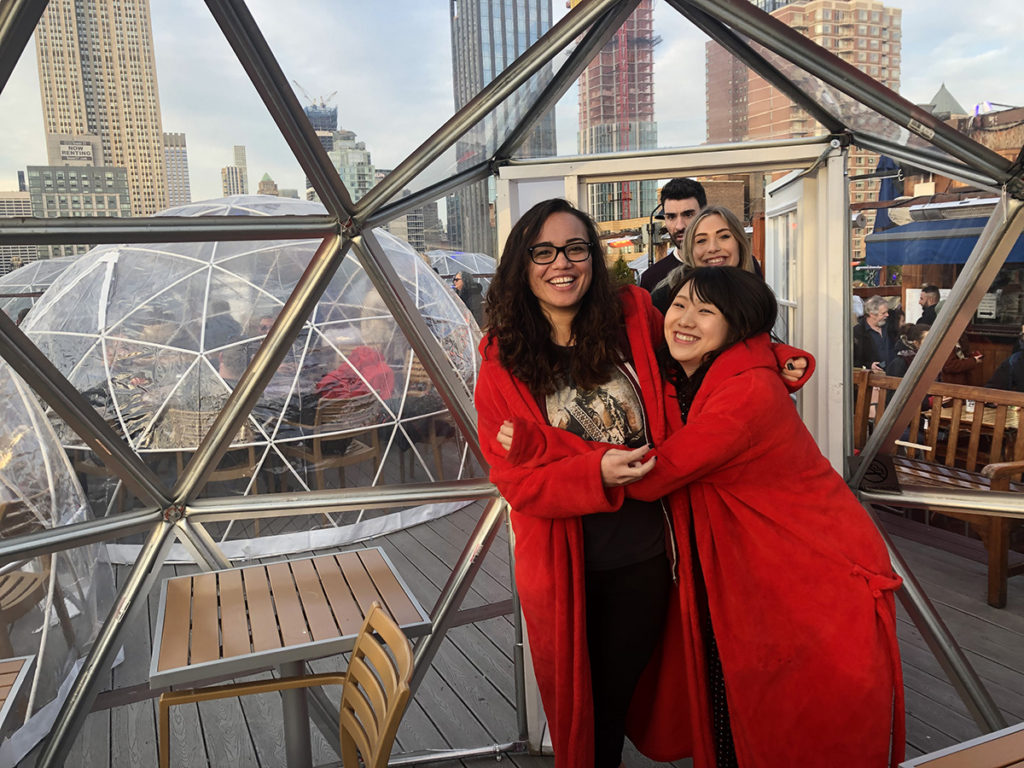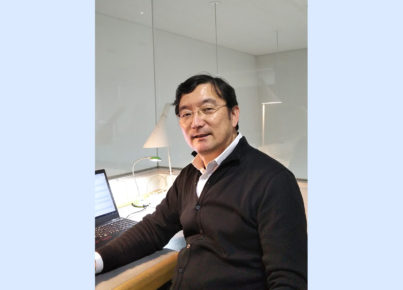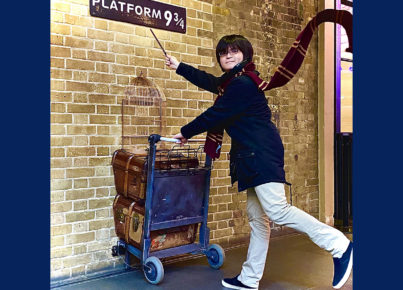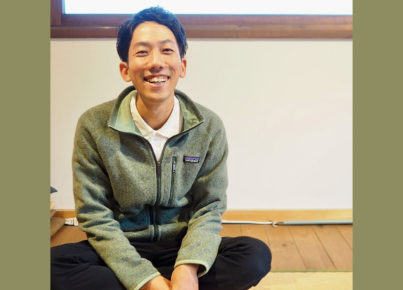“The restricted environment to cultivate the abilities”
Satsuki Kobayashi
Advisory service
Japan
Through this essay, I would like to examine the way in which my workstyle changed due to COVID-19 and how I strive for making use of these challenges for creating a safe and vigorous workplace. For that purpose, I would like to describe the hardships I have experienced in growing as a new employee under new normal, the mindsets and actions to overcome them. Then, I would like to explain the state of society I expect after COVID-19.
To begin with, let me explain my current situation. I came back to Japan last summer after a 1-year exchange program in the United States, and worked as a contract employee for half a year, then started working completely remotely at a consulting firm in Tokyo last April. That means I have experience of working as a freshman both online and offline. Compared to the traditional working style, I found three major difficulties in remote work; fostering trusting relationships, loss of the opportunity to learn how to do a job by observation on site, and the psychological hurdle to ask for help.
The first and most challenging problem for me is cultivating solid relationships with those who I have never met in person. Most of the time, we communicate through text or video call without seeing each other’s face. We are deprived of chances to meet team members and clients in reality and that makes it hard for us to grasp their personality and for deepening relationships. Besides, video calls are arranged only when it is necessary for moving projects forward and it is not intended for casual communication. New recruits who work entirely remotely are required to accomplish their task in such an uneasy environment.
The second thing that the pandemic has taken out from us is the chance to learn from observing how other people work. For example, in my former job, I naturally learned how to communicate with the clients by watching my boss talking on the phone in front of me. I used to catch project-related conversations between team leaders and get a better understanding of work and the way they think.
Thirdly, I would like to point out the psychological barrier we face when we want to ask for help. Due to the obstacles I noted above, new graduates like me have tons of questions to ask for making up for the lost learning opportunities which were supposed to be given at the office. However, asking for support is not as easy as it used to be. Since we cannot see how busy the team members are, we cannot help getting nervous worrying what if we interrupt and annoy them. I have often heard my fellows say that “I tend to miss asking for help because I am not sure when the right timing is”. This is an example of the situation where we are unable to observe the people around us makes even daily communication challenging.
Looking back, I would take the benefits from being at the office for granted. To put it the other way round, the situation encouraged me to be more proactive to learn and grow. I feel that the more passive learning decreases, the more I get proactive at work. For instance, since I cannot frequently ask my bosses for questions, I consider what I should do next and how to do it by myself without detailed directions. Since I do not have the chance to meet new people at the office, I got more active in forming new relationships than I used to be. I have participated in as many online gatherings the firm offers as possible. Currently, I participate in two self-study communities across the firm every week and other countless discussion groups. We all appreciate we met beyond departments, because our encounter would have never happened if online social activities were not as vigorous as it is today. Also, if I look on the bright side, I believe we can even improve the thoughtful attitude through communicating online. That is because, when we cannot see them in person, we are most encouraged to imagine the situations where others might be in and what they feel about it. Although such consideration must be crucial for a better work place, I have seen that we keep making inaccurate and indiscreet assumptions formed by superficial observation when we see each other face to face.
Thus, as I examined, there are some essential abilities we should rather strengthen by taking advantage of a brand-new work environment which is created by the spread of COVID-19. Moreover, I believe that these mindsets I discovered through the last 8 months are valuable regardless of when and where we work. Lastly, even though this essay is devoted to representing the unexpected situation where new graduates are, I cannot miss to point out the fact that a significant number of young people are deprived of their jobs because of COVID-19. According to the report by IMF, “17 percent of previously employed people between the ages of 18 and 29 stopped working after the pandemic hit, and 42 percent reported a drop in income” in the world (The pandemic is accelerating a shift toward more informal and precarious work, IMF). I firmly insist that it is a matter of everyone as it could happen to anyone at any time. Although I have just embarked on my first career as a working professional and am struggling to adapt to the world with COVID-19, I am determined to do what I can to support those who are unevenly troubled. To achieve this, I will be taking part in the projects in my company to facilitate the society which respects diversity and inclusion by empowering people from overseas in Japan. The change I expect the world after the COVID-19 is the same as I hoped before the pandemic; the society where all of us can be true to our aspirations, and where we are encouraged to begin our life again.
このエッセイでは、COVID-19によって自分のワークスタイルがどのように変化したのか、また、その中で生じた課題をどのように安全で活力のある職場づくりに活かしていくのかを考察したいと思います。そのために、私が新入社員として「新しい日常」の中で成長していく中で経験した苦労と、それを乗り越えるための心構えと行動について述べたいと思います。次に、私がCOVID-19後に期待する社会のあり方について述べたいと思います。
まず、私の現在の状況を説明します。私は去年の夏、アメリカでの1年間の交換留学を経て帰国し、半年間契約社員として働き、4月から東京のコンサルティング会社で完全リモートワークをしています。つまり、新入社員としてオンラインとオフラインの両方で仕事をした経験があるということです。従来の働き方と比較して、リモートワークには3つの大きな課題があると感じました。それは、信頼関係の構築、実際に現場を見て仕事を覚える機会の喪失、そして、助けが必要な時に心理的な壁があり聞けない、というものです。
まず、私にとって最も困難な問題は、直接会ったことのない人たちと強い関係性を育むことです。ほとんどの場合、お互いの顔を見ずにチャットやメール、テレビ電話でやりとりをしています。そのため、実際に顔を合わせる機会がないので、人となりを把握することができず、関係性を深めることができません。また、テレビ電話はプロジェクトを進める上で必要な場合のみ行うもので、気軽なコミュニケーションを目的としたものではありません。完全にリモートで仕事をする新入社員は、このような不安な環境の中で仕事を遂行しなければならないのです。
パンデミックが私たちから奪った2つ目のことは、他人の働き方を観察して学ぶ機会です。例えば、前職では上司が目の前で、電話で話している様子を見て、クライアントとのコミュニケーションの取り方を自然と身につけていました。また、チームリーダーのプロジェクトに関する会話を耳にして、仕事や考え方を理解することができました。
第三に、助けを求めたいときに直面する心理的な壁について指摘したいと思います。私のような新卒者は、上で述べたような壁のせいで、オフィスで与えられるはずだった学習機会の損失を補うために、たくさんの質問をしなければなりません。しかし、サポートを求めることは以前ほど簡単ではありません。チームメンバーの忙しさが目に見えないので、邪魔をしたり、迷惑をかけたりしたらどうしようと不安にならずにはいられません。仲間からは、「タイミングがわからなくて質問がしづらい」という声をよく聞きます。これは、周りの人を観察することができないために、日常のコミュニケーションさえも難しくなっている例だと思います。
今思えば、会社にいることで得られるメリットを当たり前のように受け止めていたようです。逆を言えば、この状況は、より主体的に学び、成長していくことを促してくれました。受動的な学びが減れば減るほど、仕事では積極的になれるような気がします。例えば、上司に頻繁に質問をすることができないので、細かい指示がなくても、次に何をしたらいいのか、どうすればいいのかを自分で考えています。職場で新しい人と出会う機会が少ないので、以前よりも積極的に人間関係を築くようになりました。会社が提供しているネット上の集まりには、できるだけ多く参加しています。現在は、毎週のように社内の2つの自習コミュニティに参加し、その他にも数え切れないほどのディスカッショングループに参加しています。現在のようにオンラインでのソーシャル活動が活発でなければ、このような出会いはなかったでしょうから、部署を超えた出会いに感謝しています。また、明るい面を見れば、オンラインでのコミュニケーションを通じて、思考力を高めることもできるのではないでしょうか。それは、直接会うことができない時に、相手がどんな状況にいるのか、どんな気持ちでいるのかを想像することが第一に求められるからです。このような配慮は、より良い職場を作るためには欠かせないものです。しかしながら、私たちが、対面上でのお付き合いでは、見かけから不正確かつ軽率な思い込みをしているのを目の当たりにしてきました。
このように考察をした結果、COVID-19の蔓延によって生まれた新しい職場環境を利用して、むしろ強化すべき本質的な能力があるのではないかと考えています。また、この8ヶ月間の間で気が付いた心構えは、働く場所や時間に関係なく価値のあるものだと思います。
最後に、このエッセイでは新卒者が予期せぬ状況でどう立ち回っているか、ということをご紹介してきました。しかし、COVID-19が原因でかなりの数の若者が仕事を奪われているという事実を指摘しないわけにはいきません。国際通貨基金(IMF)の報告書によると、世界では「18歳から29歳までの仕事をしていた人の17%がパンデミックの影響で働くことをやめ、42%が収入の減少を報告した」(パンデミックはよりインフォーマルで不安定な仕事への転換を加速させている:世界通貨基金(IMF)) とのことです。このことは、誰にでも、いつでも起こりうることなので、皆にとって非常に重要なことだと強く主張します。私は、社会人としての第一歩を踏み出したばかりで、COVID-19と共存する世界に適応するのに苦労しています。しかし、不公平な扱いを受けて苦しんでいる人たちをサポートするために、自分にできることをやっていきたいと思っています。 そのためにも、日本に住んでいる海外から来ている人たちを力づけることで、多様性と包括性を遵守する社会を促進するための社内プロジェクトに参加します。私がCOVID-19後の世界に期待する変化は、パンデミック前に期待していたものと同じです。それは、私たち全員が自分の志に忠実になれる社会、そして何度でも人生のやり直しや再スタートを切ることができるような社会です。

Reference:
“The pandemic is accelerating a shift toward more informal and precarious work”, IMF, retrieved in December 2020, from
https://www.imf.org/external/pubs/ft/fandd/2020/12/rethinking-the-world-of-work-dewan.htm







